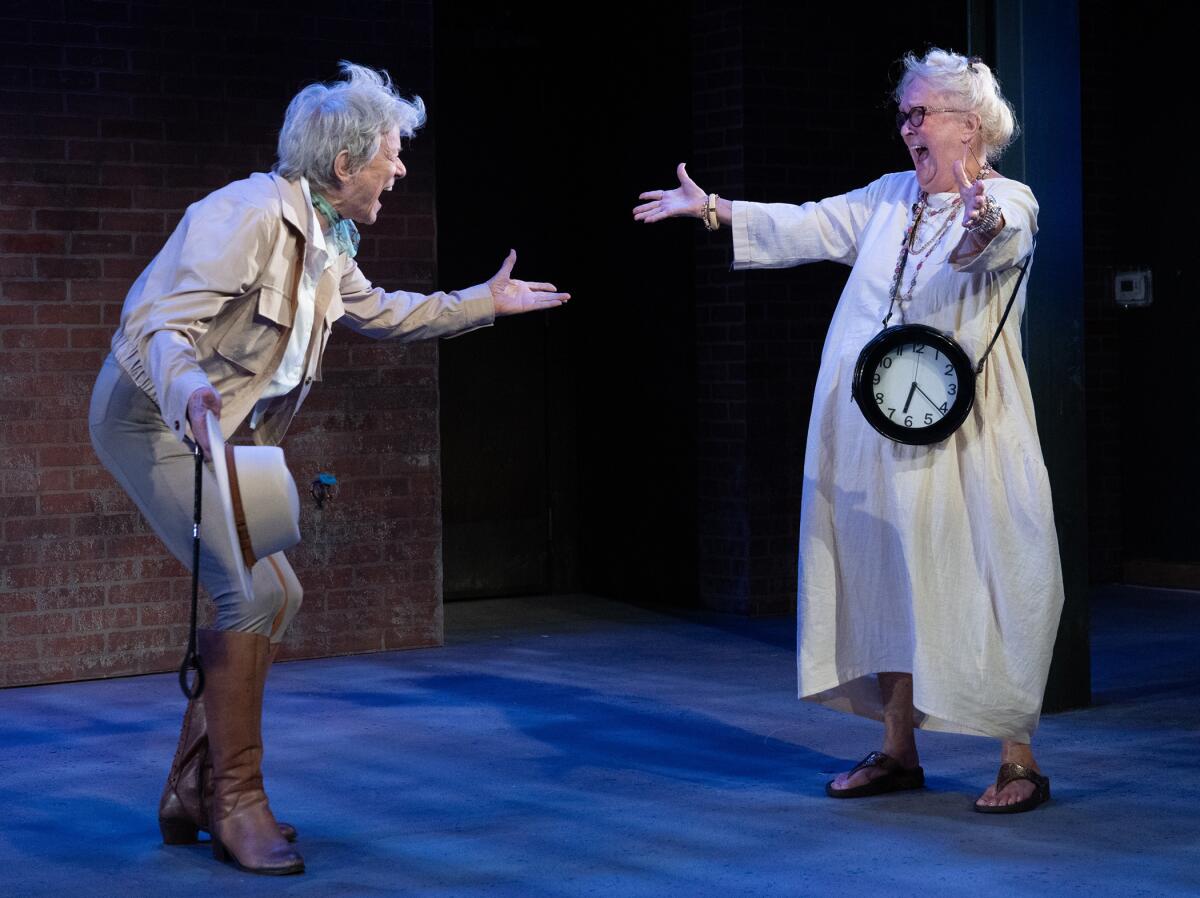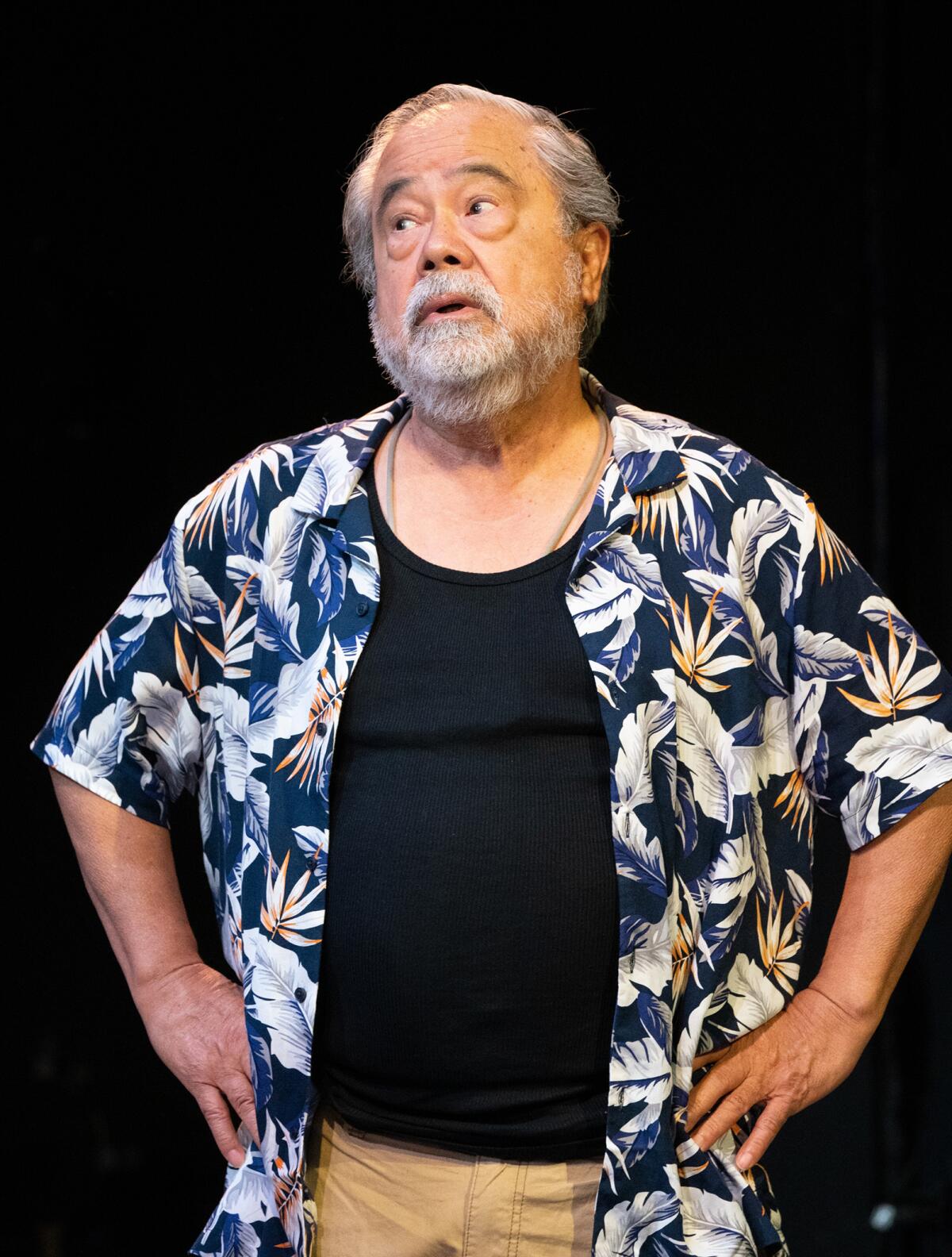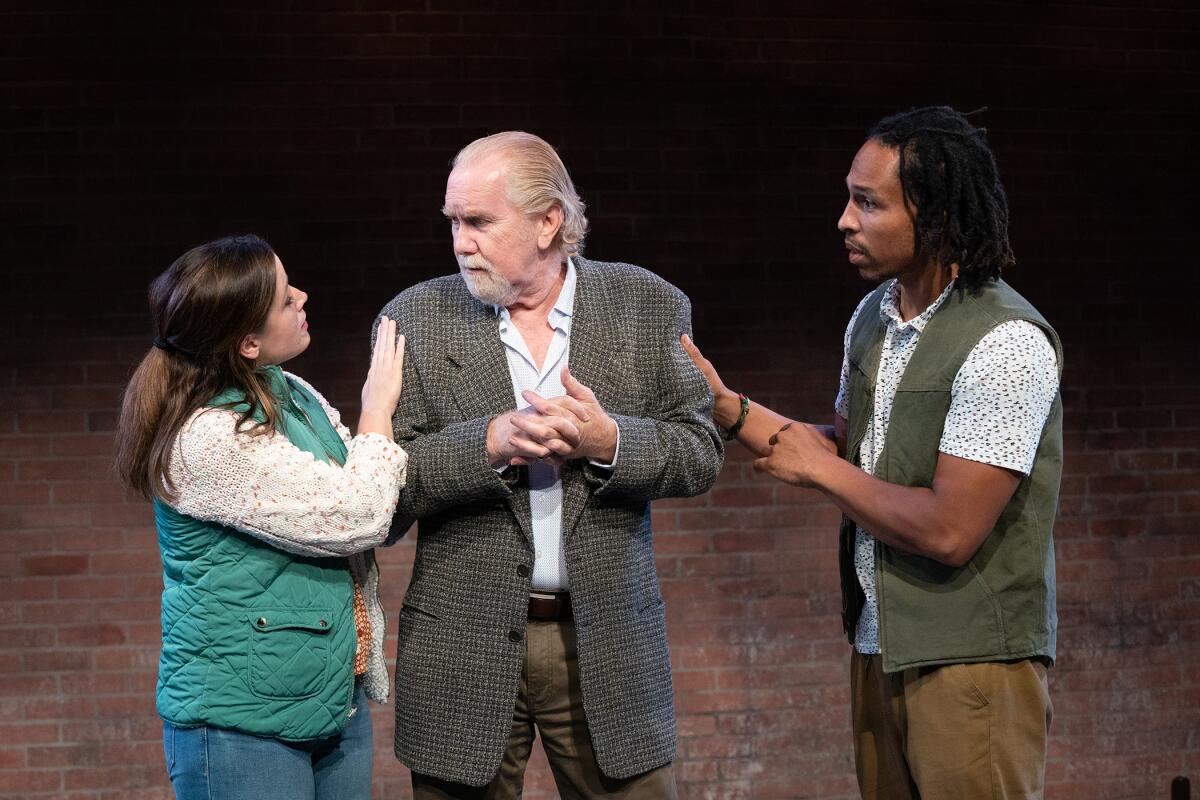Four veteran stage actors discuss taking on risky roles later in life

- Share via
Gifted actors, like fine wines, grow richer as they mature. This was the lesson I took away from the Antaeus Theatre Company production of Branden Jacobs-Jenkins’ “Everybody” at the Kiki & David Gindler Performing Arts Center in Glendale.
Directed by Jennifer Chang, “Everybody” is an adaptation of “Everyman,” the medieval morality play that has a prominent place in theater history textbooks but is rarely seen on the secular stage. Once thought to be invented by monks in “Old Timey England,” as a character cheekily explains in this unapologetically modern rewrite, “Everyman” is now believed to be derived from an earlier Dutch play that was itself based on a Buddhist fable.
Jacobs-Jenkins, the audaciously innovative author of “Appropriate,” “An Octoroon” and “Gloria,” puts his own playful stamp on an allegorical work that exposes the vanity of worldly ambition. Religious doctrine is filtered out but spiritual pedagogy is preserved as Everybody, chosen by God to die, seeks a companion for the terrifying journey and finds that neither kin nor closest friend is prepared to make such a sacrifice.
Taking inspiration from the original work’s unbounded imagination, the 37-year-old Jacobs-Jenkins briskly traverses heaven and earth with a roster of characters that includes God and Death, as well as the personifications of abstract concepts such as Love, Understanding and Time.

One of the novelties of this update is that Everybody is randomly selected at each performance out of a pool of five actors. These Somebodies are seated in the audience and called onto the stage after God, unhappy with his creation, asks Death to retrieve humanity for an accounting of its dismaying conduct.
Uncertain of which part they’ll be chosen to enact, these performers have had to memorize much of the script. The rest of this ensemble is fixed, though the dynamics of the production change with each permutation.
Four members of the acting company are seniors. (Ageism, still being alive and well in the entertainment industry, there was some hesitancy to provide exact ages, but all are over 70 and the range extends into the mid-80s.)
The youngest of this group, three-time Tony-nominated veteran Harry Groener, is part of the Somebody troupe. He played Stuff on the night I attended, gaily tromping around with shopping bags as Everybody, looking for some support, comes to recognize that this embodiment of acquisitiveness cares nothing about salvation.
The other three seniors who were part of the opening weekend cast — Anne Gee Byrd (Death), Dawn Didawick (Girl and Time) and Alberto Isaac (Love) — have fixed roles. But as the play takes pains to point out, nothing is stable in this ephemeral world.
After I had arranged to speak to these four seasoned performers, it was announced that Byrd would be leaving the production to do a television series. (Tony Amendola is the new Death.) But Byrd, who imbued the role of Death with craggy wit, was gracious enough to join our Zoom conversation. Groener and Didawick, long married in real life, appeared on the call together to join their esteemed colleagues in an unusually frank discussion of what maturity brings to actors who never stop challenging themselves. The interview has been edited for length and clarity.

Anne Gee, I just found out that you would be leaving the show for a TV opportunity. Can you tell us about it?
Byrd: It’s a new series call “Straight Man.” I play Bob Odenkirk’s mother. He’s a college professor in a meh college in the Midwest. He’s a kind of jamoke, so it should be real fun.
What drew you to this play?
Byrd: My first response was I don’t really want to be schooled by a 30-something about how to live. Later, it did occur to me that Jesus was in his 30s, so maybe I should keep my mouth shut. But I know that Harry and Dawn thought it was good. I love this writer’s work. “Neighbors,” I thought, was astounding. So I signed on despite my reservations and have grown to love it, actually.
Didawick: I was very excited to be working with Jennifer, our director, who is very bright. Since the time we saw “Appropriate” at Actors Theatre of Louisville, we have been champions of Branden Jacobs-Jenkins and wanted in some way to be part of doing his work when something came around that was right for Antaeus. I think he’s a major voice. We’re very excited to be able to do it. I never thought that anyone could adapt “Everyman.”
Does your experience of working in classics help with a play that has one foot in the 15th century and another in the 21st?
Byrd: I had a different take because of the history of “Everyman.” I thought that those playing Everybody should seem like they weren’t really actors, that they just came off the street, and were believers. It took me a while to adjust to the circus quality of it all, but it has just been tremendous fun. Charles, I want you to see it the night that Harry does Everybody.
But how would anyone know in advance when that might be if a lottery determines the casting?
Groener: Jennifer [Chang] was committed to doing the lottery. I have some issues with that mainly because I believe that when Branden conceived this he was thinking about an open run, with eight shows a week. If you do it that way, the odds are that the five actors who are putting in all this work will hit all the roles a number of times. We only have 20-something performances and so I think it should be more controlled. You can still do it in a way that every night will be different, but the actors won’t get stuck with the same role every time. I’ve talked to people who have seen the production in New York and the one here, and they don’t know whether the lottery is real.
I confess that I also wondered if the roles were decided in advance on the night I attended.
Didawick: This reminds me of when Harry did “Oklahoma!” on Broadway and spent enormous amounts of time studying with Montie Montana how to do the lariat. He learned how to really do it. And then when he did the number in New York, they said, “Oh, you use one of those trick ropes.”
Groener: Actors in other productions were using a trick rope with a hinge on it. I was taught you have to twirl it. My lariat was a real lariat.
Didawick: That’s what I mean: You put in all this work and people think it’s rigged anyway.
Groener: Now that we’ve opened, I’ve said that we have to fix this because I’ve done Stuff three times in a row already.
Your performance as Stuff was so good I thought this can’t be random. But then you have such a wealth of stage experience to fall back on.
Didawick: Combined with experience is the element of ensemble playing. Many of us have worked together before and that is one of the benefits of the long-haul members of Antaeus. We have relationships with each other. On the other hand, I enjoy the enthusiasm and bravery of the young. I feel like the older you get, the more you know how hard it really is.
What I appreciated was how the four of you were able to play in a heightened mode without overdoing it. You veterans know how to achieve this without pushing.
Didawick: I do think that somehow the older actors take human bites.
I have to assume that a lifetime spent in and around world classics has made you comfortable with a range of theatrical styles.
Isaac: I was involved with East West Players shortly after it was founded, 40-plus years ago. And in the early days of the company there was a lot of Asian theater training. Classes in Chinese opera. We touched on Noh and Kabuki. I’m not sure how much that has helped me in the long run. I do know there’s a moment in “Everybody” when I flash onto a Noh moment. I won’t tell you where. It’s my secret. But it makes me feel like, “Oh, yeah. I’ve done something like this 40 years ago.” And so I find that in my old age there’s something from my youth coming back and being useful to me as a performer.
Alberto, you play Love, the character who sticks by Everybody at the end. What’s it like playing against five different versions of the protagonist?
Isaac: I haven’t done that many plays at Antaeus, but I find it an absolute joy and a privilege to be working with these three wonderful performers in the same production. I’ve worked with Harry and Dawn on another play before and I just loved it. I’m sorry I haven’t had as many chances to play against Harry’s Everybody. Each Everybody has been a different performance. I have to make this marvelously complicated adjustment in my mind because I watch the whole play up to the point of my entrance and it feels like a new work each time I do it.
Groener: It’s like double casting, multiplied five times. When we had double casting at Antaeus — I loved it, by the way — it was always interesting. Even though you rehearsed with the actors, it’s still sort of new. So you have to be really present, really listen, really be there. And now we have to do that with four other actors and totally different interpretations.
Didawick: The difference is you do not get a run at the role. Actors need to be able to do a role like Everybody more than once in tech before they have to do it eight days later. I don’t have the burden that they have, but I sit in the audience and get nervous when the lottery comes on. The benefit that comes with doing something again and again isn’t there. Classical training helps for sure. But it’s also the fact that we’ve done many new works. Working on new plays makes you approach things differently and gets you ready for the unexpected because stuff happens.
Do you think, generally speaking, that younger actors today have a default to realism? Television is so pervasive. Has it changed the way performers tackle even nonrealistic material?
Didawick: I’m not sure whether they think they have to explain everything through movement or reaction or that this is just how acting is being taught these days.
Byrd: I think the theater is suffering from too much university training. I think most of these young actors have learned to act in classes as opposed to learning to try to reach an audience.
Didawick: We were lucky because we got to work. We went from regional theater to regional theater, doing every kind of play imaginable in our careers. Those theaters barely exist anymore.
Isaac: I could be totally wrong, but one thing that strikes me is that the inner work doesn’t seem to be translated into what I think is an attempt at stylization. But it’s not connecting. The thing that Harry does as a matter of course and so easily. “Yeah, do that,” I want to say. “Connect what’s happening inside with movements that are spare and large and at the same time true. It’s so simple. Just watch Harry.”
Groener: What I think is so wonderful about getting older in this work is that you learn how much you don’t have to do. You learn simplicity, you learn economy, you learn you don’t need to have all this energy to tell the story. It is simpler than that, and that’s almost a relief to learn.
This is a play about mortality, a subject that I know from my own experience of aging no longer seems as distant as it once did. Anne Gee, you play Death. What has it been like for you and how do you think your experience compares with your younger cast members?
Byrd: I had a wonderful husband who died at the turn of the century, and sharing his death changed my view of it. He was so graceful in doing it that my hope is simply that I will be able to do it with as much grace as he did. I don’t know how a young person could have that insight.
Didawick: In the first week of our rehearsal I lost one of my very best friends, who died in Croatia and I was trying to get the body back. And so I was surrounded by death in my personal life and surrounded by death in rehearsal. I’m in the December of my life. And then I’m watching Harry do Everybody for the first time — just watching as a colleague and an actor. At the end, I burst into tears in a way that I couldn’t get control of myself. And all the young people came running down and tried to comfort me. I said to them, because I was embarrassed and couldn’t get it together, “You all are acting it. We’re living it.”
Groener: There is a difference with how the audience receives this play depending on the age of the actor playing Everybody. If you have someone old like me, you see the whole thing differently than if you have someone who’s in their mid-20s, early 30s. I think it’s a fascinating aspect of this play.
Byrd: Speaking of roles for older people, there’s a play I so much want to do, I can taste it. “Escaped Alone” by Caryl Churchill. The four women characters are all over the age of 70. Maybe if I make enough money on this series, I’ll just produce it myself.
Please, somebody, do this play! Has anything surprised you about the response to “Everybody”?
Didawick: It’s been exciting during previews because we’ve had a very young and ethnically diverse audience. Younger than we usually have. And hearing their reaction to this play is very different than when our older friends come up to us afterwards. Maybe because what’s personally happened to them or because how close they are to the surrender.
The image of the dumpster that Death insists Everybody enter at the end is harrowing. Especially at a time when we’re all just emerging from the pandemic.
Groener: I think all of us on this screen have lost someone to COVID.
Didawick: We’ve had two years of pestilence and death.
Byrd: I’ve been busy.
Didawick: One of the reasons I wanted to do “Everybody” was because of the people you see here. We don’t know when an opportunity like this will come around again. We don’t know how many more chances we will have to work together.
'Everybody'
Where: Kiki & David Gindler Performing Arts Center, 110 East Broadway, Glendale
When: 8 p.m. Fridays, 2 and 8 p.m. Saturdays, 2 p.m. Sundays, 8 p.m. Mondays. Ends Oct. 17.
Tickets: $40
Contact: (818) 506-1983 or www.Antaeus.org
Running time: 1 hour, 30 minutes
More to Read
The biggest entertainment stories
Get our big stories about Hollywood, film, television, music, arts, culture and more right in your inbox as soon as they publish.
You may occasionally receive promotional content from the Los Angeles Times.











